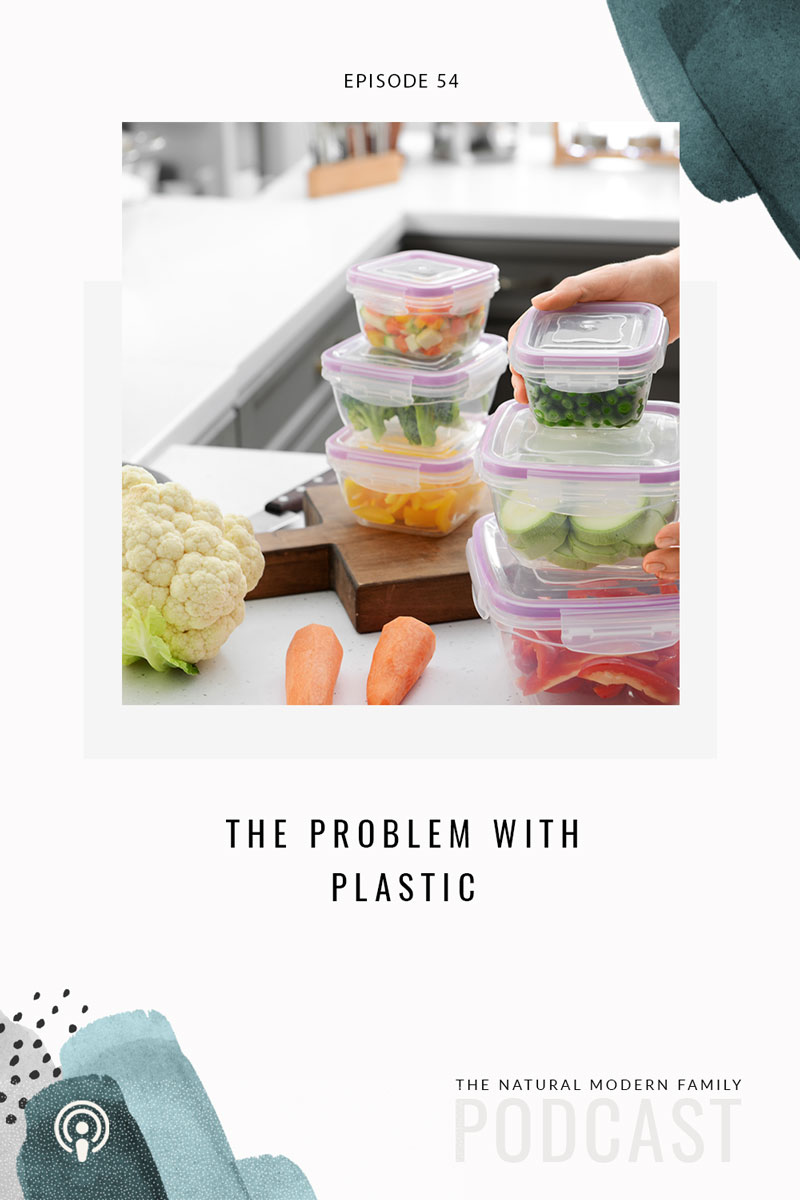Plastic is a modern day convenience that has changed the world that we live in. And while this technology has made life easier in so many ways, it can come at a cost.
BPA is one of the primary concerns with plastic, but it doesn’t end there. Beyond BPA health risks, we’re going to dive in and answer common questions: is BPA free plastic safe? And what are the health effects of bottled water? In this episode, we’re going to discuss the issues with plastic and 10 practical ways to reduce your exposure on a daily basis.
What is BPA
BPA is a xenoestrogen (hormone that mimics estrogen in the body) that disrupts hormones and poses major health risks and concerns.
Where is BPA found?
- Food and drink packaging (cans and plastics)
- Kitchen utensils like serving spoons and spatulas that melt and fray when used with hot food
- Plastic food storage contains that you put hot food in or reheat food in can leach BPA and phthalates right into the food you’re eating
- Bottle tops or lids of glass jars and other condiments (good to get BPA free mason jar lids)
- Some baby bottles (opt for these instead)
- Toys
- Store receipts
- Water pipes and PVC pipes
- Medical devices and dental sealants
BPA Health Risks
BPA lingers for generations (becoming more and more potent) and impacts offspring: Some studies show that BPA may cause damage to the behavior and prostate glands of unborn babies, infants, and young children. Even more worrisome, studies have shown that BPA produces many embryo defects, including feminization of unborn male babies, increased prostate size, atrophy of the testes and epididymides, and alternation of sperm count and density.
A lot of baby products like teethers, sippy cups, bottles, and toys all contain BPA or one of its worse cousins. U.S. regulators have restricted or banned BPA in baby products due to the knowledge that BPA causes hormonal changes. BPA has not been banned in teethers. One study tested 59 plastic teethers, and all of them tested positive for BPA. Even the ones labeled BPA Free.
BPA can leach xenoestrogens into our food from plastic containers. Stanford researcher and professor Dr. David Feldman was the first to discover that BPA can leach xenoestrogens into our food.
BPA is linked to obesity. A study from the Journal of Endocrine Society shows that BPA alternatives are associated with an increased prevalence of obesity in children. In 2013, scientists from the Kaiser Foundation Research Institute analyzed the BPA levels in 1,326 school-aged children’s urine. Researchers discovered that young girls with higher urine BPA levels were two times more likely to be obsese than the average of other children.
Regardless of your diet and exercise, BPA has been found to adversely affect glucose metabolism through insulin resistance, oxidative stress, and inflammation. Studies have also found that urine with high BPA levels is associated with prediabetes regardless of traditional diabetes factors.
BPA is linked to infertility. A 2013 study found that “long-term exposure of female mammalianas to BPA can lead to endocrine disorders, followed by the morphological and functional changes in ovary, uterus, vagina, oviducts,” causing fertility issues.
BPA also disrupts male reproductivity. Men with high urinary/blood BPA levels were shown to have abnormal semen parameters (mobility, density, count). Not only that, but men exposed to BPA also exhibited erectile ejaculatory issues and decreased libido.
BPA is linked to Vitamin D deficiency. The Endocrine Society’s Journal of Clinical Endocrinology & Metabolism conducted a 2016 study and found that BPA exposure may decrease vitamin D levels in the bloodstream.
BPA alternatives like BPS or BPF are not much better than BPA. Phthalates, which are in all plastics, create endocrine disruption, cause developmental and reproductive effects, and have even been linked to asthma.
Easy Ways to Cut Out Plastic in Your Daily Life
- Dump plastic food storage
- No plastic baby bottles. Try these.
- No plastic water bottles. Try these.
- Dump your electric kettle if it has plastic on the inside. Try this.
- Use stainless steel contains for lunch
- No plastic teethers for baby. Try these.
- Stop cooking with plastic.
- Stop lining your crock pots with plastic wrap for “easy cleanup”
- Use real plates
- Use a wooden or glass cutting board
Featured in this episode…
Plastic-free kitchen items and storage
Plastic-free baby products
Sources





READ the Latest
Health Habits
Longevity
Health Habits
Health Habits
One Comment